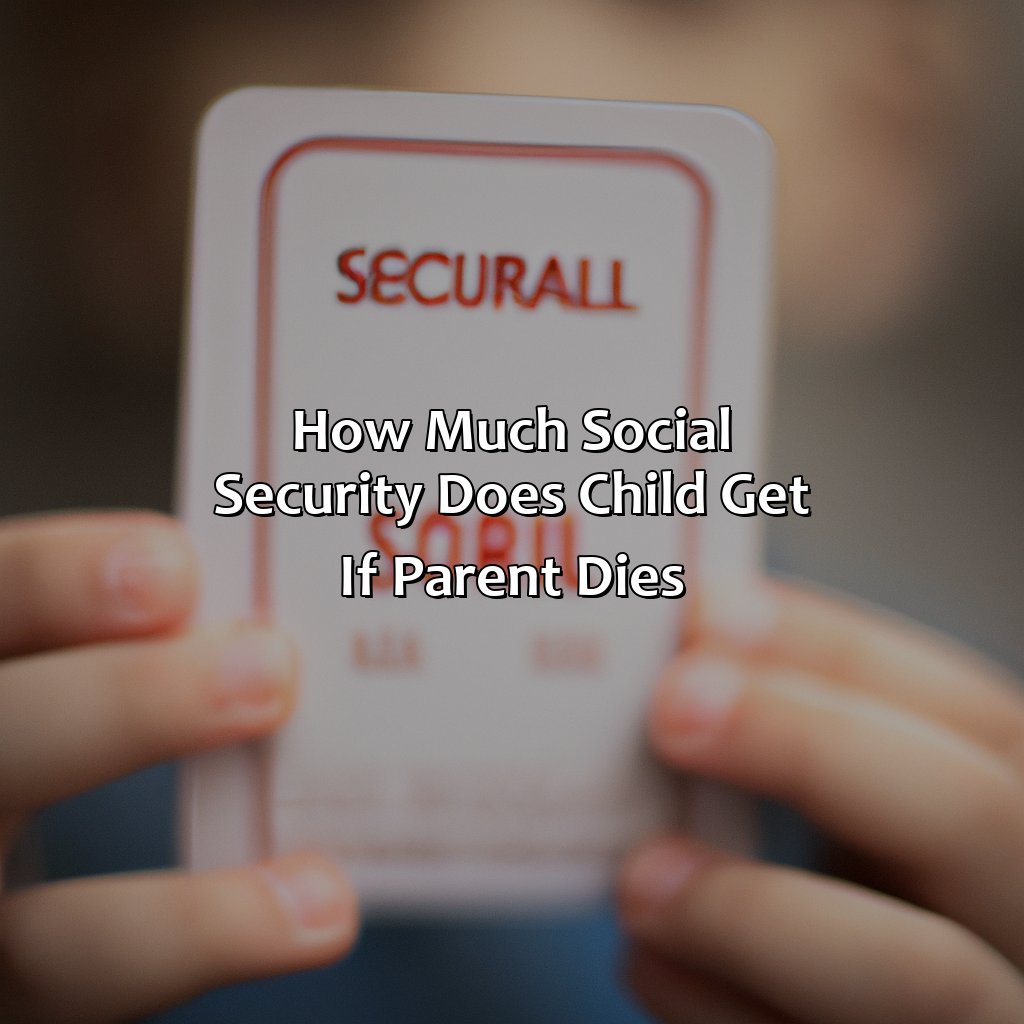How Much Social Security Does Child Get If Parent Dies?
Key Takeaway:
- Children of a deceased parent may be eligible for Social Security child benefits, which can help provide financial support and stability during a difficult time.
- Eligibility for child Social Security benefits depends on the child’s age, relationship to the deceased parent, and the parent’s work history, including the number of credits earned and years of work.
- The amount of Social Security benefits a child receives is calculated based on several factors, including the deceased parent’s earnings history and the number of eligible children. There is a maximum benefit amount that may be adjusted based on family income.
Are you concerned about the financial security of your children in case of your untimely death? This article explains how much a child is entitled to receive in Social Security benefits if their parent passes away. You can find out how to access and maximize these benefits for your little ones.
Social Security Benefits for Children of a Deceased Parent
Social Security Benefits for Children of a Deceased Parent provide financial assistance to children in case their parent dies. These benefits are determined based on various factors, such as the deceased parent’s income, Social Security tax paid, and age at the time of death.
- Children can receive up to 75% of their deceased parent’s Social Security benefits.
- If the child is under 18 or up to 19 and still in high school, they are eligible for benefits until their 18th or 19th birthday.
- The benefits continue until the child is 18 or until they are 19 if still in high school or have a disability.
In addition to the aforementioned benefits, there are other criteria that need to be met, such as the child being unmarried and not earning more than a certain amount per month.
Pro Tip: It is crucial to report any changes in the child’s life, such as marriage or income, as it can affect the amount of benefits received.
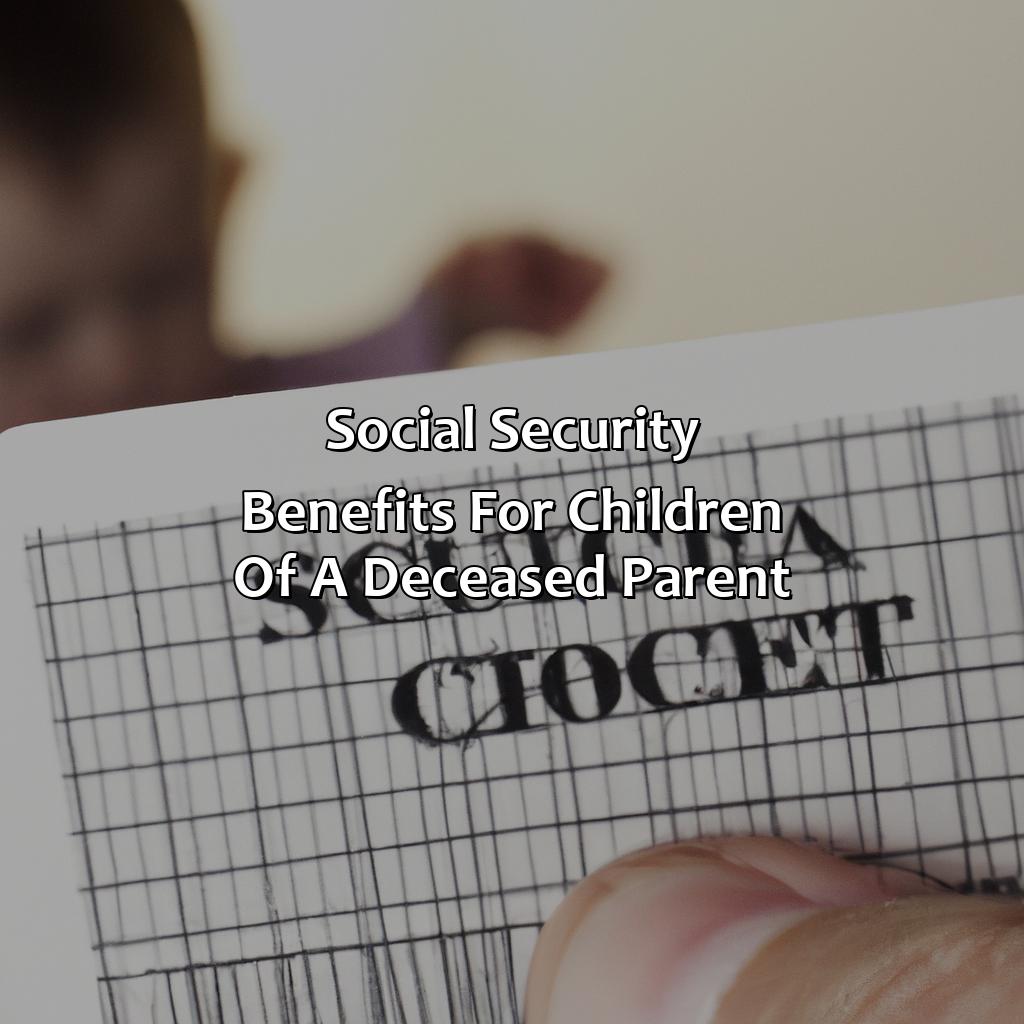
Image credits: retiregenz.com by Joel Washington
Eligibility for Child Social Security Benefits
Want to get social security benefits for your child? Age and relationship requirements must be met. Plus, the parent’s work history must be considered. Let’s examine age and relationship criteria for the child. Plus, we’ll look at the parent’s work history and how it affects their child’s eligibility.
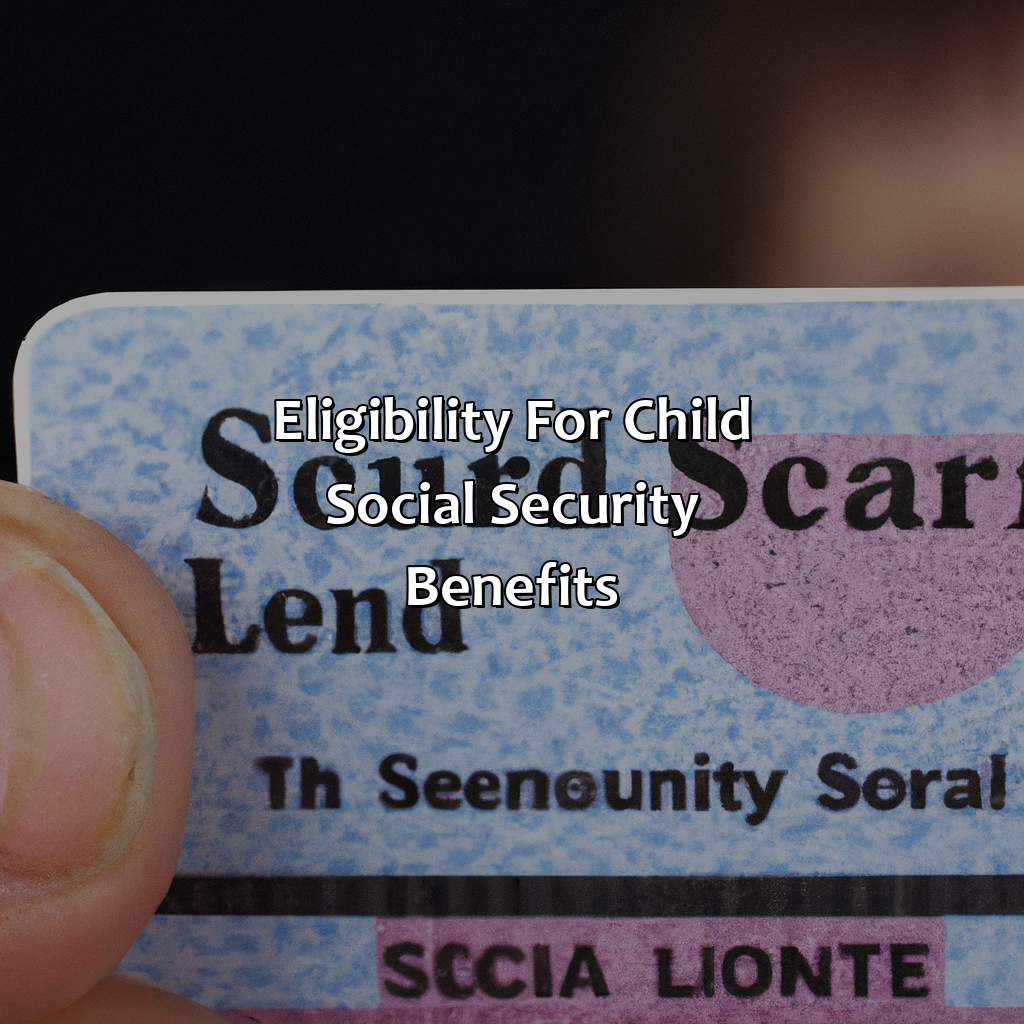
Image credits: retiregenz.com by Adam Duncun
Age and Relationship Requirements
Child social security benefits eligibility requirements are based on age and relationship to the deceased parent. Certain guidelines must be followed for a child to receive death benefits, such as being under 18 or a full-time student under the age of 19. Additionally, the child must be unmarried, disabled before the age of 22, and dependent on the deceased parent’s income.
It’s important to note that each scenario is unique, and there may be additional requirements depending on individual circumstances. It is recommended that individuals seeking social security benefits for their child consult with an expert to ensure they are meeting all necessary eligibility criteria.
Don’t risk missing out on essential support during difficult times. Familiarize yourself with child social security benefit eligibility requirements and take necessary steps to secure financial aid for your family.
With the strict work history requirements for child social security benefits, it’s a good thing they don’t count your kindergarten finger painting as employment experience.
Parent’s Work History Requirements
The requirements related to the working history of a deceased parent determine if their child is eligible for social security benefits. Specifically, the number of work credits earned by the deceased parent factors into eligibility. The child can receive up to 75% of the deceased parent’s Social Security benefit, with a cap on the total family benefits paid out.
It is important to note that parents must have worked for a certain amount of time and earned enough credits to be eligible for Social Security in order for their children to receive benefits. Additionally, eligibility criteria may differ based on the specific circumstances surrounding a parent’s death.
In some unique cases, children who are not biological or adopted may still be eligible for Social Security benefits after the death of a parent. For example, stepchildren and grandchildren could be eligible if certain conditions are met.
One real-life scenario involved a mother who passed away before she was able to reach retirement age and start receiving Social Security benefits. Her young son was still able to receive survivor benefits until he turned 18 years old, allowing him to continue paying for necessary expenses like school supplies and extracurricular activities.
Just like a piñata, the amount of social security benefits for children is hard to predict, but hopefully more rewarding in the end.
Amount of Social Security Benefits for Children
Do you want to learn about the Social Security a child gets when a parent passes? You must comprehend the amount of benefits, max amount, and the way it is calculated.
Here’s some insight into these vital parts of the Social Security benefits for children.
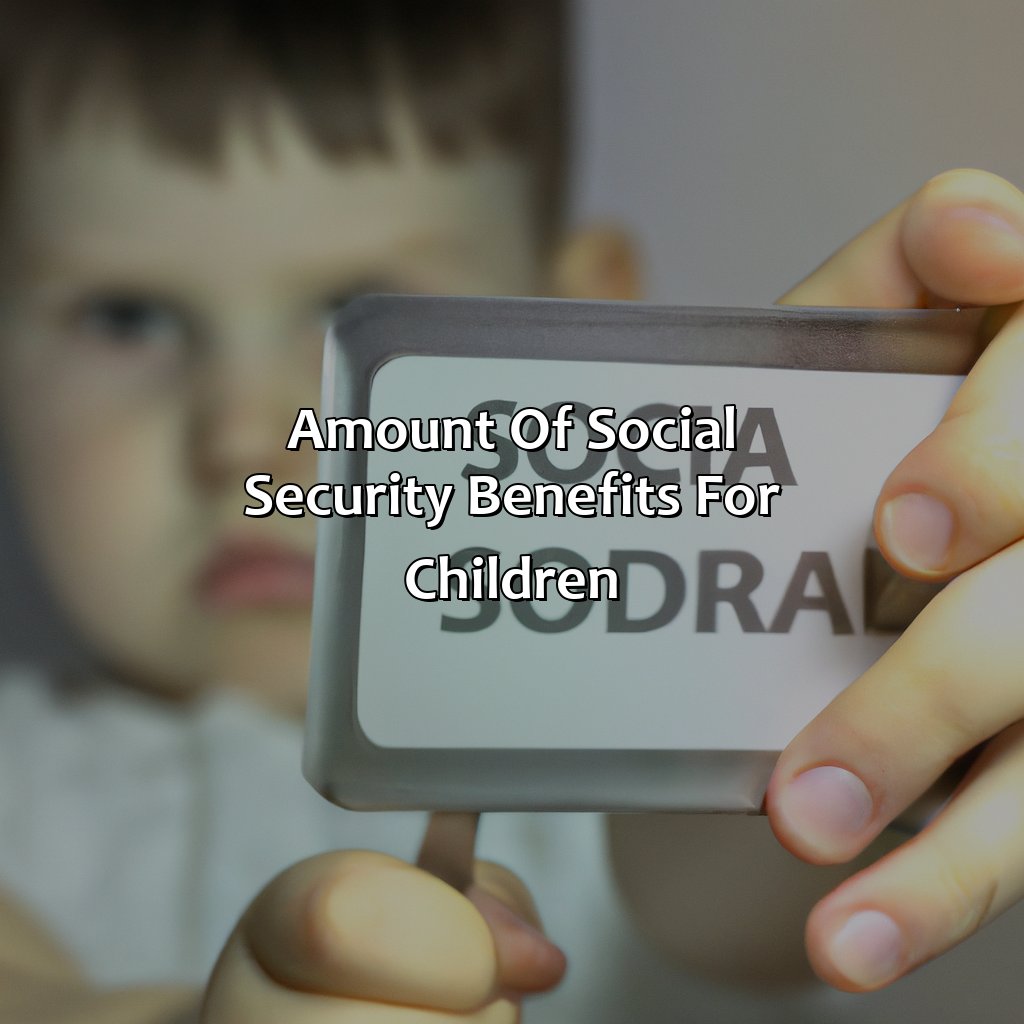
Image credits: retiregenz.com by Adam Woodhock
Factors Affecting Benefit Amount
Understanding the Determinants of Social Security Benefits for Children
Social security benefits for children who have lost a parent depend on multiple factors. These determinants have to be analyzed carefully to calculate the amount of benefit the child will receive.
– Age of Child: The younger the child, the higher the benefit amount, due to their dependency on a parent for sustenance.
– Parent’s Work History: The parent’s work history and social security contributions are critical in determining the entitlement amount.
– Number of Eligible Children: Benefit amounts also vary depending on whether one or more children are eligible for benefits.
Additionally, other eligibility requirements like citizenship and relationship may need to be met before applying for benefits.
Pro Tip: Calculating social security benefits can prove complicated; getting legal assistance from an experienced lawyer may help streamline the process.
Get ready to do some math, because the maximum benefit amount for children receiving social security is about to make your brain hurt.
Maximum Benefit Amount
The Maximum Allowable Benefit Amount awarded for Children upon the death of a Parent can differ based on several variables such as parental earnings history and benefit eligibility. Below is a Table that shows the maximum Social Security benefits payable to eligible children for a deceased parent with gradually increasing Average Indexed Monthly Earnings (AIME).
| AIME Range | Maximum Monthly Benefit for Each Child |
| $0 – $750 | $717 |
| $750 – $1124 | $1,076 |
| $1125 – $1500 | $1,435 |
It’s essential to note that there is also a family maximum benefit amount limit which determines the maximum total amount that the surviving family members, including children, can receive. The limit may range from 150% to 180% of the deceased worker’s PIA or primary insurance amount computed based on their earnings record.
To maximize Social Security benefits for eligible children who have lost a parent, here are some suggestions. 1. ensure all necessary documents required by the SSA are submitted promptly. 2. understand that other factors such as having step-siblings can affect eligibility and may require consulting with SSA representatives. Lastly, consider taking advantage of various financial planning tools available to help plan accordingly for additional expenses arising from this challenging situation.
Calculating benefits is like solving a Rubik’s Cube, except with less colors and more tears.
How Benefits are Calculated
Social Security Benefits for Children are calculated based on specific eligibility criteria and the amount their parent received. These benefits can help support a child in the unfortunate event of their parent’s death. Here’s what you need to know about the calculation process:
- Benefit Amounts depend on the parent’s record- A child may receive up to 75% of the parent’s benefit amount.
- The Parent must have worked enough- For children to qualify, their deceased parent must have worked long enough under Social Security. Typically, they should have at least ten years of work history.
- Age Matters- Children aged below 18 or still in High School can receive benefits until they graduate or turn 19.
- Disability Benefits- If a child becomes disabled before age 22, they can receive social security disability benefits as a dependent upon the deceased parents’ record.
- Income Limits Apply- If a child has income limits of their own, it can impact how much they could receive from social security benefits.
- No Dual Entitlement – It would be best if you remembered that children receiving survivors’ benefits due to a parent’s death cannot simultaneously receive both their own Social Security Disability Insurance (SSDI) and survivor’s benefits from the same record.
It is worth noting that when multiple children qualify, each member typically receives an equal share of up to 180% of the total monthly benefit. Therefore, if there happen to be three eligible kids qualified for survivors’ benefits, each one gets around 60%.
Social Security Benefits for Children play an essential role in supporting them through challenging times. In case both parents pass away, children can still qualify for these earnings as long as both parents were working and paying into Social Security. It’s crucial to check with the SSA directly about your specific situation and eligibility conditions.
Historically, social security benefits for children became available in 1939, yet it wasn’t until the 1950s that these provisions gained momentum. Congress passed laws to provide increased pension protection from families’ breadwinners’ untimely death, supporting their dependents in challenging times financially.
Applying for child social security benefits is like filling out a death certificate for your parent, but with more paperwork.
Applying for Child Social Security Benefits
Apply for Child Social Security Benefits? No worries! Here’s what to do: get the required documents and learn how to apply. This is the answer to the financial worries faced after a parent has passed away. We have broken down the details for you:
- Required Documentation
- The child’s birth certificate or other proof of birth
- The parent’s death certificate
- Proof of the parent’s earnings
- Proof of the child’s expenses
- How to Apply
- Calling the Social Security Administration at 1-800-772-1213
- Visiting your local Social Security office
- Completing the online application
Make sure you have the following documents:
You can apply for child social security benefits by:
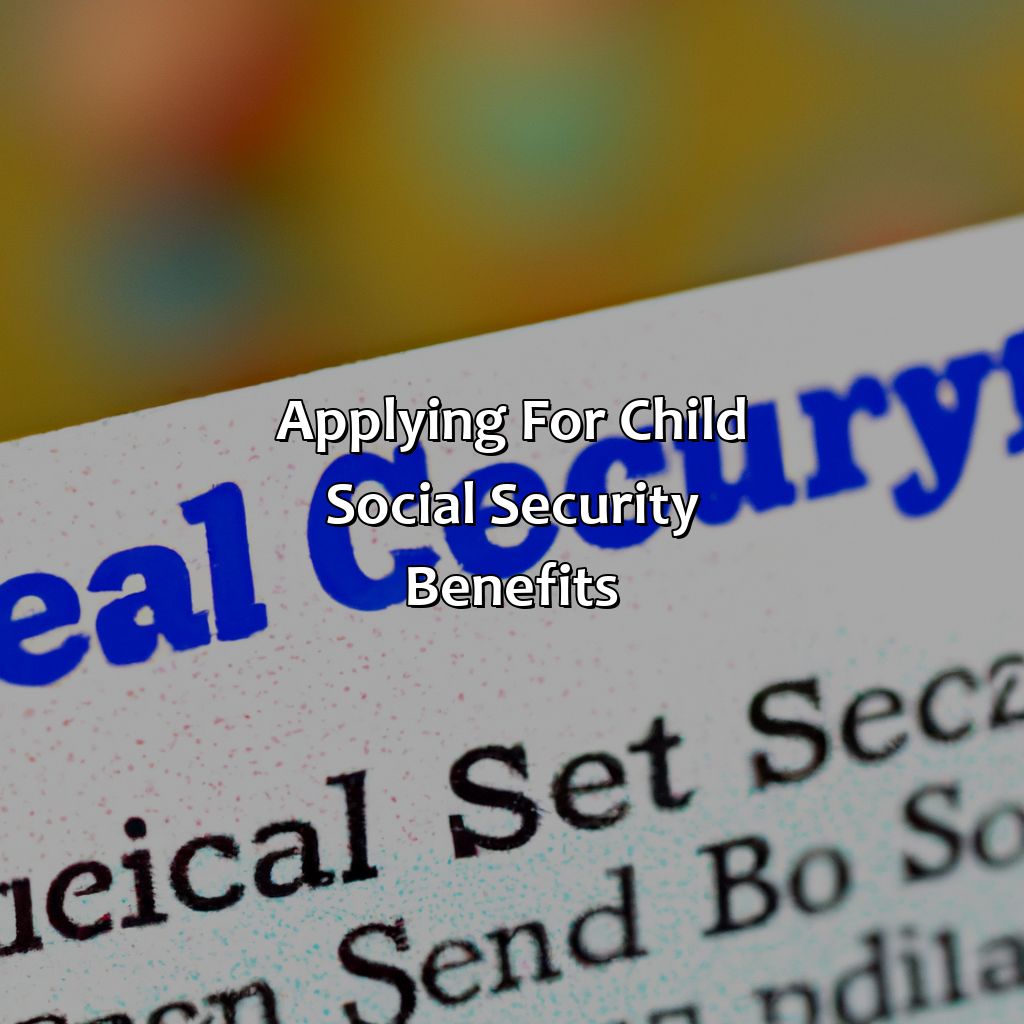
Image credits: retiregenz.com by Yuval Duncun
Required Documentation
When it comes to filing for Child Social Security Benefits, there are certain documents you’ll need to provide. These include:
- Proof of Child’s Birth
- Proof of Child’s Citizenship/Legal Residency in US
- Proof of Parent’s Death and Relationship to Child
- Information pertaining to other benefits the child may be receiving.
In addition, it is important to note that if a child is adopted, they may still qualify for Social Security Benefits based on their biological parent’s earnings record. It is best to speak with a representative from the Social Security Administration for further guidance.
A family recently found themselves in need of Social Security Benefits after a tragic accident claimed the life of one parent. Thankfully, with all required documentation in place, they were able to receive benefits promptly and without issue, allowing them to focus on healing and protecting their family during a difficult time.
Applying for child social security benefits may not bring your loved one back, but at least it can help ease the burden of funeral costs.
How to Apply
For those wondering about the process of obtaining Child Social Security Benefits, here is a step-by-step guide:
- Check if your child qualifies for benefits: typically, this requires the parent to have paid Social Security taxes for a minimum period before their passing.
- Gather necessary documentation: applying for Child Social Security Benefits will usually require presenting the child’s birth certificate, parent’s death certificate, and other relevant information to verify eligibility.
- Complete an application: this can be done online, in-person at a local Social Security Administration (SSA) office, or over the phone by contacting the SSA directly.
- Submit all necessary documentation alongside the completed application and ensure full accuracy. Any mistakes or omissions could delay processing time or even result in denial of benefits.
- Wait for a decision to be made: it can take up to several months to receive approval or denial of benefits. Parents should remain patient and follow up with any relevant agencies if they have not heard back within several weeks.
It’s important to note that children are typically entitled to receive up to half of their parent’s Social Security benefit amount. Additionally, different factors like when the deceased parent began receiving benefits can also affect how much a child receives.
One thing parents should consider is acting promptly when applying for these benefits. In many cases, there are deadlines by which applications must be submitted – waiting too long could mean missing out on much-needed financial support. Be sure to carefully read all instructions provided by the SSA and take action as soon as possible.
Some Facts About How Much Social Security a Child Gets if a Parent Dies:
Children may be eligible for social security benefits if a parent dies and they meet certain requirements, including being unmarried and under the age of 18. (Source: Social Security Administration)
The amount of social security a child receives after a parent’s death depends on the parent’s earnings history. (Source: Social Security Administration)
If there are multiple eligible children, they may share the benefits. (Source: LegalZoom)
In some cases, children may continue to receive social security benefits until they are 19 or 22 years old if they are still in school. (Source: Social Security Administration)
If a child is disabled, they may be eligible to receive social security benefits for their entire life, regardless of their age. (Source: Social Security Administration)
FAQs about How Much Social Security Does Child Get If Parent Dies?
How much social security does a child get if a parent dies?
Child survivors of deceased parents may be eligible to receive up to 75% of the deceased parent’s Social Security benefit.
How old must a child be to receive Social Security benefits after a parent’s death?
Children must be under 18 years old or under 19 and still in high school to receive Social Security benefits after a parent’s death. In some cases, benefits may be extended until the age of 22 for disabled children.
What happens to a parent’s Social Security benefits if they die?
If a parent passes away, their Social Security benefits stop. However, certain survivors may be eligible to receive monthly benefit payments.
Who is eligible to receive Social Security benefits after a parent’s death?
Eligible survivors include children, a surviving spouse caring for a child under age 16, and adult children who were disabled before age 22.
What documents are needed to apply for Social Security benefits after a parent’s death?
Documents needed to apply for Social Security benefits after a parent’s death include the deceased parent’s Social Security number, death certificate, and birth certificate of the child or children who qualify for benefits.
Is there a limit to the number of children who can receive Social Security benefits after a parent’s death?
No, there is no limit to the number of children who can receive Social Security benefits after a parent’s death. However, each child’s benefit amount may be reduced if there are multiple eligible children.
 Checkout this IRS Loophole
Checkout this IRS Loophole 
